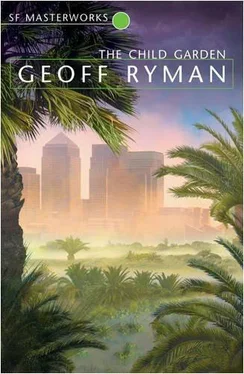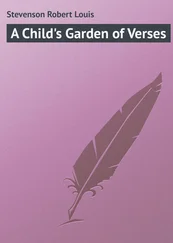‘Oh. When I was young,’ said Rolfa, ‘I went into hibernation. I was only about nine or ten years old. It’s something we can do if the weather gets too bad and we have to wait it out. But this time there was no real reason for it. The vet said it was stress.’
Rolfa lay down on her side. She began to graze. Her long pink tongue reached out and seized a fistful of grass, tore it out of the ground and lazed it up into her mouth. There was something comfortable in the way she talked and chewed at the same time.
‘I just curled up and went to sleep for six months. And all the time I was under, I was thinking about music’
Rolfa moved her cud to one side of her mouth.
‘I could play piano quite well by then, and I just went over and over all the pieces I knew. Picking them apart, putting them back together. Didn’t think about anything else. Didn’t dream, didn’t open my eyes.’
‘How did they get you out of it?’ Milena asked.
‘The vet gave me an injection,’ said Rolfa, and smiled with her ruined teeth.
Milena wanted to lie next to her on the grass, in the sun. She wanted to curl up under her arm and go to sleep. But Milena was afraid. All she did was shift closer to her.
‘You can remember your childhood,’ said Milena, looking down at the expanse of Rolfa’s body, wishing she had known Rolfa in childhood, had been part of her life then.
‘Can’t you remember your childhood?’ Rolfa sat up.
Milena shook her head. No, Milena couldn’t.
‘Something happened. I don’t know. I can’t remember any of it. Well, I know I was born in Czechoslovakia — I can sometimes remember parts of that very hazily. Everything else is gone.’
‘Oh, I shouldn’t like that at all!’ said Rolfa. ‘There are all sorts of things I remember. I’d hate to forget them.’
‘Like what.’
‘Musk oxen,’ said Rolfa. ‘Especially the calves. They’re like little round balls of fluff on tiny, scurrying black legs. That’s when we lived on the tundra, what was left of it. Forests advancing you see, but we managed to save some of them.’
‘There’s no musk oxen in the Antarctic’
‘No, no indeed, no, we lived in Canada for a while, you see? Papa thought we should go there to make our fortune. North instead of South. Didn’t work. He kept trying to save the musk ox. Herd them north, where there was still some tundra. Strange thing to do really. It makes me think my father might not be so bad after all. He taught them how to play football. They’re terribly intelligent, you see. They played in teams. I used to play with them. I used to dream that one day I’d turn into a musk ox.’ Rolfa’s face was soft and her smile was fond. ‘Don’t you have any childhood memories at all?’
‘No. They gave me a lot of virus when I was ten. Maybe that knocked them all out of me. I don’t remember.’
‘Ah,’ said Rolfa. Something strange seemed to happen to her face. It seemed to melt, and the eyes seemed to pull back, like snails into a shell. ‘Ah yes, of course. I keep forgetting. They give you people viruses, don’t they.’
She smiled again, and the eyes opened out, with a new expression. She was smiling, and the eyes still seemed fond, and the face still seemed happy, but it was pained too. It was a strange, disturbing mixture, like Rolfa’s music. There was something powerful in the eyes, that made Milena draw back. Milena couldn’t understand it. She had no experience. She didn’t know what it meant. The viruses couldn’t help her.
It was routine. Each day, like milk in a pan, about to boil over, Milena would nearly say, ‘I love you.’
Or she would reach for Rolfa, to caress her in a way that would leave no doubt, come so near to the point of doing it that she could feel her own arms or the shadow of her arms, move out and hold her.
But she didn’t do it.
Gradually a new idea began to seep in, so slowly that Milena never knew when she first had it. This idea was also transfiguring.
Rolfa did not need to be cured. Yes, she was immune to the viruses; her behaviour was her own; and Milena had given her a thousand unmistakable signs, she thought, of how she felt; and Rolfa had not responded. Rolfa did not appear to be interested. The great hulking innocent probably had no idea of what had been happening.
They were not going to be lovers. Milena had been wrong. Rolfa’s grammar was undoubtedly strange, but not bad, not bad, no.
When Milena was most alone, in the middle of rehearsals for Love’s Labour’s Lost, she found herself coming to a glum acceptance of that. She sat on the periphery and watched the other actors sleepwalking through their parts.
The young boy with a beard was playing Berowne. He spent the whole of one afternoon glaring. Something had happened to him. Milena knew of it vaguely, something about a girl. That day he did not play the character of Berowne. He played himself, carried away by the words. ‘I who have been love’s whip,’ he said bitterly, spit leaping out of his mouth.
Listening to him, Milena found that she was angry.
’That wimpled, whining, purblind, wayward boy
This Signor Junior, this giant-dwarf, Dan Cupid.’
Milena listened. They were all listening, as the boy-actor stood rigid, glowering. Milena’s hands had curled into fists.
A whitely wanton with a velvet brow,
With two pitch-balls stuck in her face for eyes.’
The hatred in it, the violence in it, made Milena jump. Who was speaking? The boy, Berowne, Shakespeare?
’And so I sigh for her, to watch for her,
To pray for her! Go to, it is a plague.’
‘Stop,’ said the director. He was thirty-five years old, and there were creases in the flesh around his eyes. He sat very still, looking at the boy-actor. ‘You know how that’s supposed to sound, ‘Jonz,’ he said. He sat a moment longer. ‘I give up,’ he said, and stood up. ‘Say it how you want to, Jonz, if it makes you feel better.’
But it does, thought Milena, it does make me feel better. It’s meant to hurt, it’s meant to bite, it’s meant to mean something to us too. We have to act it.
‘All of you,’ said the director, looking worn, ‘do it how you want to.’ Then he turned and walked up the aisle, leaving them.
‘Go home, I guess,’ shrugged the blandly cheerful fellow who was playing the King. Berowne still glowered.
‘Your way was better,’ Milena told Berowne. He only nodded.
Outside it was a drab, cloudy English summer afternoon. So fine, she and Rolfa would be friends. Could she accept that? She could accept that. It happens to everyone. Perhaps when she was certain of the friendship, she would tell Rolfa what she had felt just in passing, so that there would be no dishonesty — only friendship and music, until one day Milena would be cured. One day they would remember to Read her, and give her the viruses again. Perhaps she wouldn’t be like her father, after all. Perhaps it wouldn’t kill her. Why be a pessimist? she thought.
Until then she and Rolfa would be friends. Nothing would have to change. Even their routine, Milena thought could stay the same.
One evening they met for dinner and Rolfa was drunk. She had started to drink again. She arrived drunk, reeking in the middle of the Zoo cafe. She did not duck or cringe. She came up to Milena and prodded her shoulder with a finger the size of a salami sausage.
‘Out,’ she managed to say. ‘Outside.’ Under the fringe of fur, her eyes were baleful. She walked backwards towards the door. ‘Come on.’
‘Rolfa? Rolfa?’ Milena heard herself, heard her own voice drained, hopeless, frail, and she hated the sound of it. ‘Is there something wrong?’
Rolfa made a kind of twisted, barking yelp. ‘Oh no,’ she said. ‘No, no, no, no.’ She made a kind of waving motion with her hand, brushing something away. Very suddenly it became a slapping motion, in the air. She was dangerous.
Читать дальше












